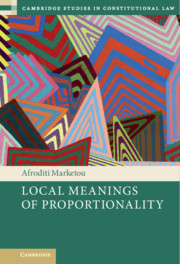Book contents
- Local Meanings of Proportionality
- Cambridge Studies in Constitutional Law
- Local Meanings of Proportionality
- Copyright page
- Contents
- Acknowledgements
- 1 Proportionality as a Cultural Practice
- Part I Questioning the Success of Proportionality
- 2 Proportionality in French Public Law: Plus Ça Change, Plus C’est la Même Chose
- 3 Proportionality in English Public Law: Continuity and Change
- 4 Proportionality in Greek Public Law:
- Conclusion of Part I
- Part II Great Expectations
- Part III European Integrations
- Conclusion
- Bibliography
- Index
Conclusion of Part I
from Part I - Questioning the Success of Proportionality
Published online by Cambridge University Press: 08 July 2021
- Local Meanings of Proportionality
- Cambridge Studies in Constitutional Law
- Local Meanings of Proportionality
- Copyright page
- Contents
- Acknowledgements
- 1 Proportionality as a Cultural Practice
- Part I Questioning the Success of Proportionality
- 2 Proportionality in French Public Law: Plus Ça Change, Plus C’est la Même Chose
- 3 Proportionality in English Public Law: Continuity and Change
- 4 Proportionality in Greek Public Law:
- Conclusion of Part I
- Part II Great Expectations
- Part III European Integrations
- Conclusion
- Bibliography
- Index
Summary
A survey of the use of proportionality language by French, English and Greek lawyers confirms the ‘doctrinal imperialism’ of proportionality. Since its emergence in France, proportionality has been perceived as conspicuous, and especially since the 2000s, it proliferates in case law. In England, proportionality spreads as a human rights head of review and culls the ‘sacred cows’ of common law review. In Greece, it is a hegemonic method of legal reasoning and it replaces pre-existing categories and standards. However, what seems to be an irresistible spread of proportionality is not so much connected to its systematic application in practice. In fact, proportionality’s content has been very different across space and time. Contrary to the claims of certain proportionality enthusiasts, proportionality has not always functioned as a pronged test for the optimal realisation of fundamental rights. Very often, structural features of the Alexyan proportionality model, like balancing or reasoning in prongs, are absent from judicial reasoning.
- Type
- Chapter
- Information
- Local Meanings of Proportionality , pp. 132 - 134Publisher: Cambridge University PressPrint publication year: 2021

